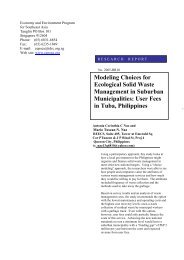systems research - the IDRC Digital Library - International ...
systems research - the IDRC Digital Library - International ...
systems research - the IDRC Digital Library - International ...
Create successful ePaper yourself
Turn your PDF publications into a flip-book with our unique Google optimized e-Paper software.
The interface role of farming <strong>systems</strong> <strong>research</strong><br />
Almost every country uses different terms for FSR and its component methods<br />
(rapid rural appraisal, on-farm trials, and pilot production projects). Each country<br />
has important political reasons for its choice of terms. For example, "production<br />
programs can only be done by <strong>the</strong> Indonesian Extension Service, so <strong>the</strong> FSR team<br />
does a Development Research Project", or FSR in <strong>the</strong> Francophone scientific<br />
community means <strong>the</strong> systematic political analysis of <strong>the</strong> national agricultural<br />
economy, <strong>the</strong>refore, <strong>the</strong> FSR program becomes an "on-farm <strong>research</strong> program"; or<br />
multilocation tests have been done on rented farmland because of a lack of regional<br />
stations; <strong>the</strong>refore, "on-farm trials" become "participatory trials" to underline <strong>the</strong><br />
difference in methods.<br />
Most of <strong>the</strong>se terminological variations relate to <strong>the</strong> fact that FSR as a<br />
distinct institutional entity is a newcomer to national scenes and is an interface<br />
between well-established bureaucracies. Its aim is to solve problems, not to carry<br />
out a predetermined set of actions, although it has a core methodology of its own.<br />
Successful programs have been seen to act as intermediaries between <strong>the</strong> station-<br />
based <strong>research</strong> establishment and extension services, marketing boards, and<br />
irrigation authorities. Although <strong>the</strong>y are usually based in <strong>the</strong> <strong>research</strong> service, <strong>the</strong>y<br />
do not confine <strong>the</strong>mselves to traditional scientific <strong>research</strong> methods and sometimes<br />
find <strong>the</strong>mselves under attack for encroaching on <strong>the</strong> turf of ano<strong>the</strong>r agency or<br />
operating outside <strong>the</strong>ir <strong>research</strong> mandate.<br />
Management of farming <strong>systems</strong> <strong>research</strong>: pulling strings and straws<br />
A number of issues have emerged concerning <strong>the</strong> organization and management of<br />
FSR project and programs:<br />
o Flexibility in <strong>the</strong> application of FSR principles. In many cases, it was<br />
observed that successful projects changed <strong>the</strong> technologies and <strong>the</strong><br />
emphasis of <strong>the</strong> FSR activities as <strong>the</strong>y proceeded. In cases where a<br />
staged approach appeared to have been followed, it was found that <strong>the</strong><br />
program had continuously monitored and reformulated its program in<br />
accordance with <strong>the</strong> changes in policy, development, and context.<br />
o Clarification and agreement on FSR objectives. Most of <strong>the</strong> FSR projects<br />
had a wide range of differing and sometimes conflicting objectives. The<br />
expectations of many projects were over-ambitious. A management<br />
lesson from <strong>the</strong> case studies was that greater emphasis should be given<br />
during FSR planning to <strong>the</strong> projection of expected outcomes and to <strong>the</strong><br />
methods of monitoring and assessing <strong>the</strong>se outcomes. These issues should<br />
include how to assess <strong>the</strong> extent of FSR influence on <strong>research</strong> station<br />
priorities and on <strong>the</strong> streng<strong>the</strong>ning and monitoring of farmer<br />
experimentation.
















